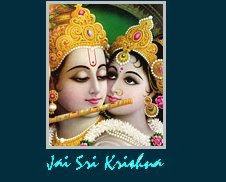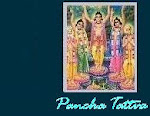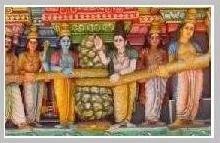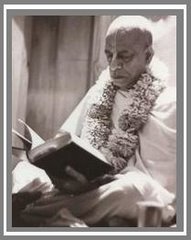Everyone has an opinion as to how the world was created, how humans evolved and even about the popular UFO phenomenon. Opinions are a dime a dozen and simply a waste of valuable time,especially if you sincerely want to know the truth.
 |
| Plato |
When it comes to understanding the Absolute Truth opinions will not help us, therefor Sri Krsna has clearly given us direction. Below are his exact words.
 |
| Krsna and Arjuna |
"tad viddhi praṇipātena
paripraśnena sevayā
upadekṣyanti te jñānaḿ
jñāninas tattva-darśinaḥ"
++
++
SYNONYMS
tat — that knowledge of different sacrifices; viddhi — try to understand; praṇipātena — by approaching a spiritual master; paripraśnena — by submissive inquiries; sevayā — by the rendering of service; upadekṣyanti — he will initiate; te — you; jñānam — into knowledge; jñāninaḥ — the self-realized; tattva — of the truth; darśinaḥ — seer.
TRANSLATION
Just
try to learn the truth by approaching a spiritual master. Inquire from
him submissively and render service unto him. The self-realized soul
can impart knowledge unto you because he has seen the truth.
PURPORT
The
path of spiritual realization is undoubtedly difficult. The Lord
therefore advises us to approach a bona fide spiritual master in the
line of disciplic succession from the Lord Himself. No one can be a bona
fide spiritual master without following this principle of disciplic
succession. The Lord is the original spiritual master, and a person in
the disciplic succession can convey the message of the Lord as it is to
his disciple. No one can be spiritually realized by manufacturing his
own process, as is the fashion of the foolish pretenders. The Bhāgavatam (6.3.19) says, dharmaḿ tu sākṣād bhagavat-praṇītam:
the path of religion is directly enunciated by the Lord. Therefore,
mental speculation or dry arguments cannot help lead one to the right
path. Nor by independent study of books of knowledge can one progress in
spiritual life. One has to approach a bona fide spiritual master to
receive the knowledge. Such a spiritual master should be accepted in
full surrender, and one should serve the spiritual master like a menial
servant, without false prestige. Satisfaction of the self-realized
spiritual master is the secret of advancement in spiritual life.
Inquiries and submission constitute the proper combination for spiritual
understanding. Unless there is submission and service, inquiries from
the learned spiritual master will not be effective. One must be able to
pass the test of the spiritual master, and when he sees the genuine
desire of the disciple, he automatically blesses the disciple with
genuine spiritual understanding. In this verse, both blind following and
absurd inquiries are condemned. Not only should one hear submissively
from the spiritual master, but one must also get a clear understanding
from him, in submission and service and inquiries. A bona fide spiritual
master is by nature very kind toward the disciple. Therefore when the
student is submissive and is always ready to render service, the
reciprocation of knowledge and inquiries becomes perfect. ---Bhagavad-gītā As It Is 4.34


















